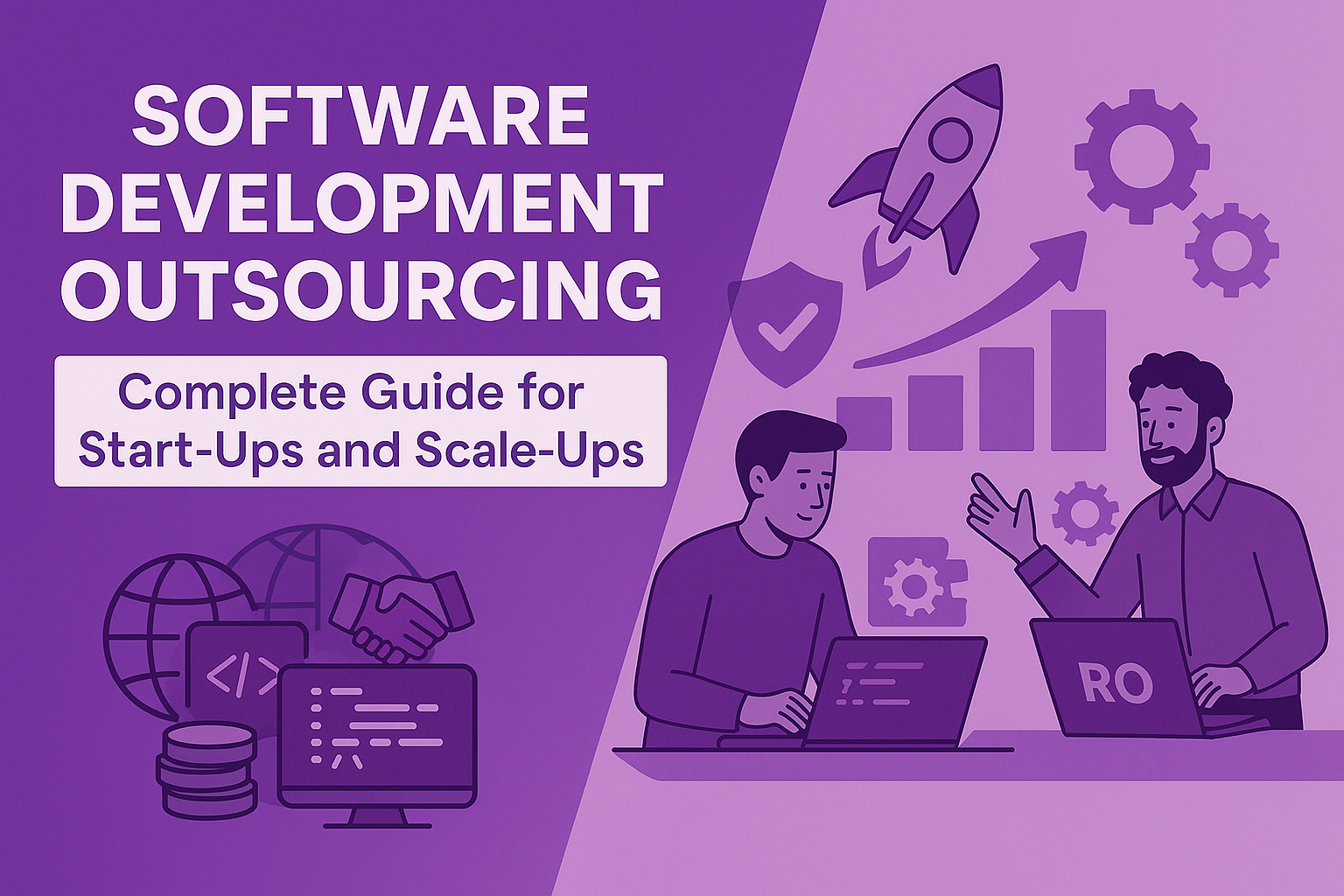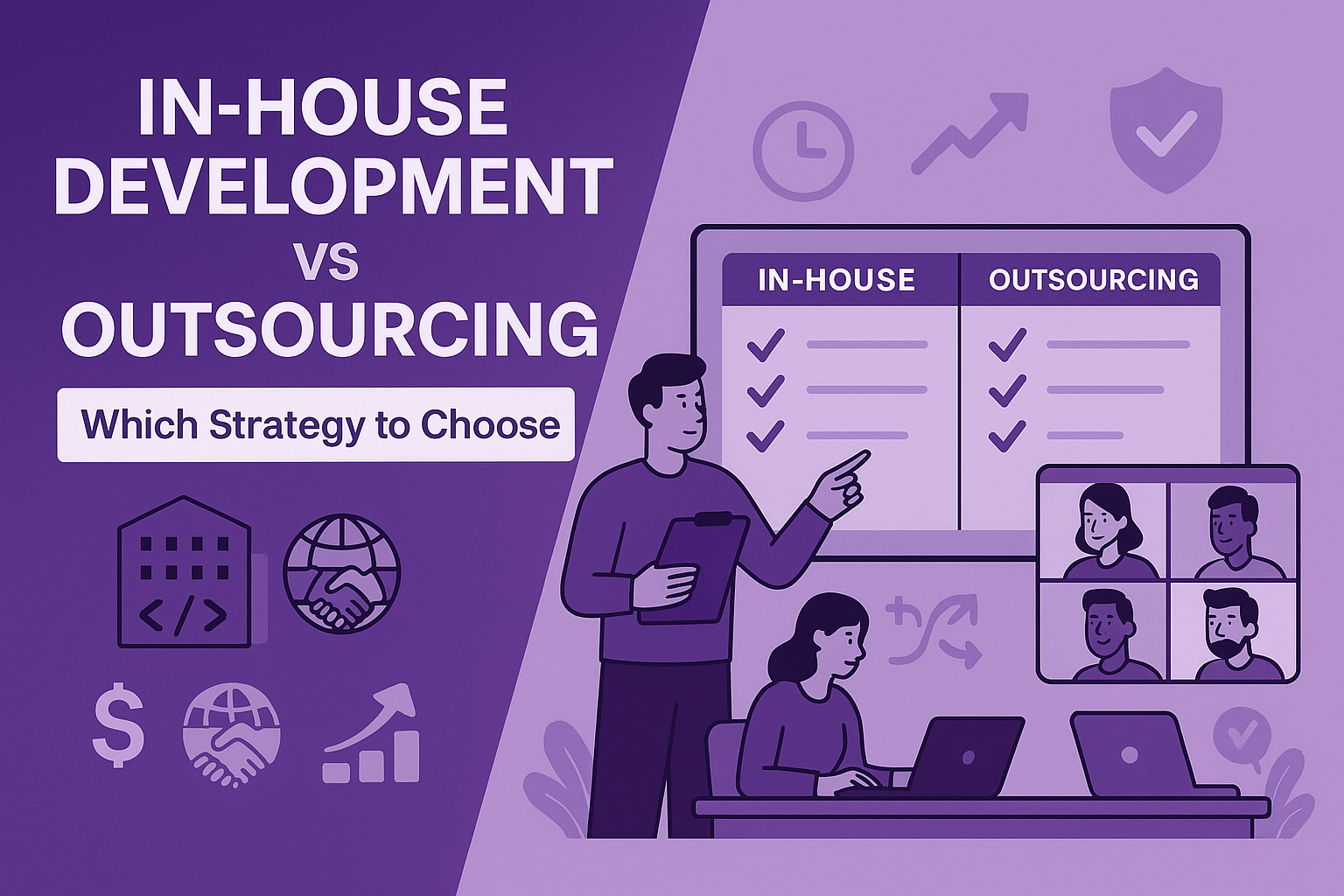According to Statista, the global software development market is projected to reach $858 billion by 2028, with outsourcing representing over 60% of all development activities.
What is Software Development Outsourcing?
Software development outsourcing is the practice of hiring external teams or companies to handle your software development projects instead of building an in-house team. This strategic approach allows businesses to leverage specialized skills, reduce operational costs, and focus on their core competencies while experienced developers handle the technical implementation.
The global custom software outsourcing market has grown exponentially, with companies increasingly recognizing the value of partnering with specialized development teams. From custom software development to mobile app creation, outsourced teams can handle virtually any technical challenge your business faces.
Why Should You Outsource Software Development?
Cost Efficiency and Budget Optimization
When you outsource software development, you can reduce your development costs by 40-60% compared to maintaining an in-house team. You eliminate expenses related to recruitment, training, benefits, office space, and equipment while gaining access to top-tier talent at competitive rates.
Deloitte's Global Outsourcing Survey shows that 78% of organizations report positive ROI from strategic outsourcing initiatives within the first year.
Access to Specialized Expertise
External development teams bring years of experience across diverse industries and technologies. Instead of spending months training internal staff on new frameworks or programming languages, you can immediately tap into proven expertise in areas like artificial intelligence, blockchain, mobile development, or cloud architecture.
Stack Overflow's Developer Survey reveals that finding qualified developers remains the top challenge for 73% of companies, making outsourcing an attractive solution.
Faster Time-to-Market
Experienced software development outsourcing partners can accelerate your development timeline significantly. They have established workflows, proven methodologies, and the right tools to deliver high-quality software faster than building capabilities from scratch internally.
Scalability and Flexibility
Custom software outsourcing allows you to scale your development capacity up or down based on project requirements. Whether you need additional developers for a major release or specialized skills for a specific feature, outsourcing provides the flexibility to adapt quickly to changing business needs.
How Does Software Development Outsourcing Work?
Project Discovery and Planning
The outsourcing process begins with a comprehensive discovery phase where your chosen partner analyzes your requirements, understands your business goals, and creates a detailed project roadmap. This phase typically includes technical architecture planning, timeline estimation, and resource allocation.
Team Assembly and Communication Setup
Your outsourcing partner assembles a dedicated team tailored to your project's specific needs. This includes project managers, developers, designers, and quality assurance specialists. Clear communication channels are established using tools like Slack, Jira, or Microsoft Teams to ensure seamless collaboration.
Development and Iteration
The development phase follows agile methodologies with regular sprints, reviews, and iterations. You maintain full visibility into the development process through regular updates, demos, and collaborative planning sessions. Quality assurance is integrated throughout the development cycle to ensure robust, bug-free software.
Deployment and Ongoing Support
Upon completion, your outsourcing partner handles deployment, provides comprehensive documentation, and offers ongoing maintenance and support services. This ensures your software continues to perform optimally and evolves with your business needs.
How Much Does Software Development Outsourcing Cost?
Factors Affecting Outsourcing Costs
Software development outsourcing costs vary significantly based on several key factors:
- Geographic location of the development team
- Complexity and scope of your project
- Technology stack and specialized skills required
- Project duration and team size
- Level of customization needed
Regional Cost Comparison
- Eastern Europe (Bulgaria, Ukraine, Poland): $25-50/hour
- Western Europe: $50-100/hour
- North America: $75-150/hour
- Asia (India, Philippines): $15-40/hour
IT outsourcing to Bulgaria offers an optimal balance of European quality standards, competitive pricing, and cultural alignment for Western businesses.
Hidden Costs to Consider
While hourly rates provide a baseline, consider additional costs such as project management, communication overhead, potential timezone challenges, and quality assurance requirements when budgeting for your outsourcing project.
Which Software Development Outsourcing Model Should You Choose?
The decision of where to outsource software development depends on your specific requirements, budget constraints, and project complexity.
Offshore Development Services
Offshore development services involve partnering with teams in distant countries, often with significant timezone differences. This model typically offers the lowest costs but may present communication and coordination challenges.
Best for: Large-scale projects with flexible timelines, cost-sensitive initiatives, and well-defined requirements.
Nearshore Software Development
Nearshore software development partners teams in nearby countries with similar timezones and cultural alignment. This approach balances cost savings with improved communication and collaboration.
Best for: Projects requiring frequent communication, agile development approaches, and cultural compatibility.
What Are Common Software Development Outsourcing Challenges?
Communication and Cultural Barriers
Different communication styles, language barriers, and cultural differences can impact project success. Mitigation strategies include establishing clear communication protocols, using collaborative tools, and choosing partners with strong English proficiency and cultural understanding.
Quality Control and Standards
Ensuring consistent code quality and adherence to your standards requires careful partner selection and robust quality assurance processes. Look for partners with established coding standards, peer review processes, and comprehensive testing methodologies.
Security and Intellectual Property Protection
Protecting your intellectual property and sensitive data is crucial when working with external teams. Ensure your outsourcing partner has robust security measures, signed NDAs, and compliance with relevant data protection regulations.
Project Management and Timeline Coordination
Maintaining project momentum and meeting deadlines requires experienced project management and clear milestone definition. Choose partners with proven project management capabilities and transparent reporting processes.
How Do You Select the Right Software Development Outsourcing Partner?
Technical Expertise and Portfolio Review
Evaluate potential partners based on their technical capabilities, relevant industry experience, and portfolio of similar projects. Request case studies and speak with previous clients to understand their track record of success.
Working with an experienced software development team in Bulgaria provides access to highly skilled developers with European education standards and competitive rates.
Communication and Cultural Fit
Assess communication skills, responsiveness, and cultural alignment during initial conversations. Consider timezone overlap, language proficiency, and working style compatibility to ensure smooth collaboration.
Security and Compliance Standards
Verify that potential partners maintain appropriate security certifications, follow industry best practices, and can comply with your specific regulatory requirements.
Pricing Structure and Contract Terms
Compare pricing models, understand what's included in quoted rates, and review contract terms carefully. Look for transparent pricing, flexible engagement models, and clear intellectual property clauses.
When Should You Start Software Development Outsourcing?
Optimal Timing Indicators
Consider software development outsourcing when you:
- Need to accelerate development timelines
- Lack specific technical expertise internally
- Want to reduce development costs significantly
- Need to scale development capacity quickly
- Have well-defined project requirements
Preparation Requirements
Before engaging an outsourcing partner:
- Document your requirements clearly
- Define success metrics and milestones
- Establish communication protocols
- Prepare relevant background materials
- Set realistic timeline expectations
How Do You Ensure Successful Software Development Outsourcing?
Establishing Clear Requirements and Expectations
Success begins with comprehensive requirement documentation, clear success criteria, and well-defined deliverables. Invest time upfront in detailed planning to avoid costly changes later in the development process.
Implementing Effective Communication Protocols
Regular check-ins, status updates, and collaborative planning sessions maintain project momentum and alignment. Use project management tools that provide transparency and enable efficient coordination.
Maintaining Quality Standards Throughout Development
Implement code review processes, automated testing protocols, and regular quality assessments to ensure your software meets your standards and requirements.
Building Long-term Partnership Relationships
View outsourcing as a strategic partnership rather than a transactional relationship. Invest in relationship building, provide feedback for continuous improvement, and consider long-term collaboration opportunities.
Software Development Outsourcing Best Practices
Agile Development Methodologies
Agile outsourcing approaches that enable iterative development, regular feedback incorporation, and adaptive planning. This methodology works particularly well with outsourced teams and ensures continuous alignment with your evolving requirements.
Quality Assurance and Testing Integration
Comprehensive QA outsourcing services throughout the development lifecycle rather than treating it as a final step. This approach identifies issues early, reduces overall development costs, and ensures higher quality deliverables.
Intellectual Property Protection
Implement robust IP protection measures including comprehensive NDAs, clear ownership clauses, and secure development environments to protect your valuable intellectual property.
Performance Monitoring and Optimization
Establish key performance indicators (KPIs), regularly monitor project progress, and implement continuous improvement processes to optimize outsourcing outcomes.
Conclusion: Transform Your Business with Strategic Software Development Outsourcing
Software development outsourcing represents a powerful strategy for businesses looking to innovate rapidly, control costs, and access world-class technical expertise. When executed properly with the right partner, outsourcing can accelerate your digital transformation and provide sustainable competitive advantages.
The key to successful outsourcing lies in careful partner selection, clear communication, and treating the relationship as a strategic partnership rather than a simple vendor arrangement. By following the best practices outlined in this guide and choosing an experienced partner who understands your industry and technical requirements, you can achieve remarkable results while focusing on your core business objectives.




.png)
